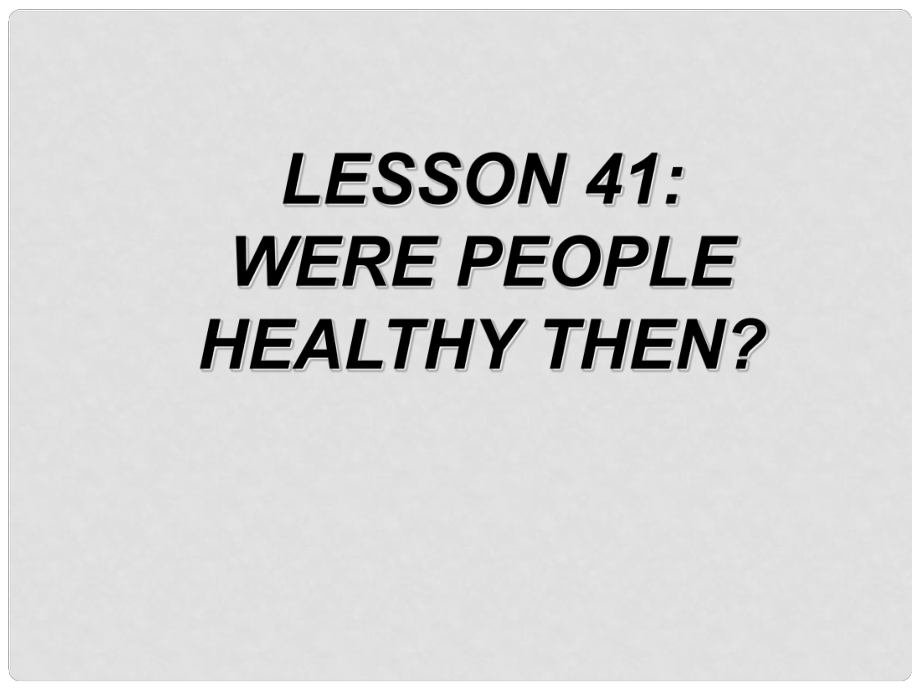《七年級(jí)英語下冊(cè) Unit 7 Lesson 41 Were People Healthy Then課件 (新版)冀教版》由會(huì)員分享,可在線閱讀����,更多相關(guān)《七年級(jí)英語下冊(cè) Unit 7 Lesson 41 Were People Healthy Then課件 (新版)冀教版(26頁珍藏版)》請(qǐng)?jiān)谘b配圖網(wǎng)上搜索。
1���、Learning Aims1. Understand the meaning of the dialogue.2. Remember and use the mastery vocabulary and know some important words.3. Understand and write down some missing words as heard in sentences or passages in different contexts.New WordsNew words:nationhuntspendnaturalpow-wow國家�����;民族國家����;民族打獵��;搜索打獵��;搜索
2��、用(錢)����;花(錢)用(錢)�;花(錢)自然的;天然的自然的��;天然的帕瓦帕瓦(北美原住民族一北美原住民族一種歌舞慶典種歌舞慶典)ListeningListen and answer1. How was life for the First Nations people a long time ago? Listen and answer the questions. 1. What did they eat? 2. Were they healthy? 3. Did they go fishing? 4. What did they do after work?Check the answers1
3、. How was life for the First Nations people a long time ago? Listen and answer the questions. 1. What did they eat? 2. Were they healthy?They always went fishing and hunting for food.Yes. They were very healthy. Check the answers1. How was life for the First Nations people a long time ago? Listen an
4����、d answer the questions. 3. Did they go fishing? 4. What did they do after work?Yes, they did.They rested and played together. Its Sunday morning. Dena Morin and her grandfather, Mr. Morin, are fishing at the lake.Dena: Grandpa, did people go fishing a long time ago?Mr. Morin: Well Dena, we are First
5、 Nations people. Our people came to Canada a long tome ago. At that time, there were no supermarkets. Our people always went fishing and hunting for food.Dena: Were people healthy then?Mr. Morin: They were very healthy. They spent a lot of time outdoors. They worked hard. And they ate good, natural
6�、food like fish and vegetables.Dena: Was life hard at that time?Mr. Morin: It was hard. But people were healthy and happy. After a hard day of work, people rested and played together. In the evenings, they often made a big fire. Some people played the drums and others danced around the fire. They cal
7、led this dance the pow-wow.Dena: We still have pow-wow dances today. I cant wait for the pow-wow next year! First Nations people have pow-wow dances every yearRead the lesson and complete the passage with the correct words.2 First Nations people came to _ a long time ago. They went fishing and _ for
8����、 food every day. They spent a lot of tome outdoors and they ate good, _ food. After a hard day of work, they often made a big _ and had pow-wow dances. Some people played the drums and _ danced around the fire.Canadahuntingnaturalfireothers GrammarThere be 句型句型A pow-wow is a gathering of first Natio
9、ns people. It is a special event. People meet to dance, sing, talk and have fun. Sometimes, they even have dancing competitions. How long does a pow-wow usually last? Well, an important pow-wow can last for one week!Rewrite the sentences using the proper form of “there be”.31.They didnt have superma
10���、rkets at that time. There were no supermarkets at that time.2.Many different vegetables are in the salad._3.A letter is at his front door._There are many different vegetables in the salad.There is a letter at his front door.Rewrite the sentences using the proper form of “there be”.34.Many clouds are
11��、 in the sky._5.Two interesting reports are in todays newspaper._6.Many people are on the beach._There are many clouds in the sky.There are two interesting reports in todays newspaper.There are many people on the beach.Work in pairs. Life was different a long time ago. Talk about the differences betw
12���、een life then and life now.4Example:A: Today we buy food at eh supermarket. But there no supermarkets a long time ago. Where did people get food?B: People went fishing and hunting for food. They always ate good, natural food. Now people eat a lot of fast food.Exercises!1. The boy wants to have a _ (
13、health) body.2. We always eat meat _ (two) a day.3. He is good at _ (swim).4. We must _ (do) our homework after school.5. She _ (have) breakfast at 6:30 yesterday morning.I. 用所給詞的適當(dāng)形式填空用所給詞的適當(dāng)形式填空�。 healthy twiceswimmingdo had1. _ supper, we should wash our hands.A. AtB. Before C. AfterD. For2. _ do
14、you eat donuts? Once a week.A. How far B. How long C. How often D. How muchII. 單項(xiàng)選擇單項(xiàng)選擇��。3. Breakfast is good _ our health.A. at B. in C. for D. of4. I like peas _ than onions.A. muchB. manyC. moreD. most 5. You need _ vegetables _ a healthy body.A. eats, for B. eating, for C. to eat, at D. to eat, f
15����、or1. My uncle likes pork. He likes beef better. (合并成一句話) My uncle likes _ _ _pork.2. His sister goes to the zoo once a week. (對(duì)劃線部分提問)_ _ _ his sister go to the zoo?III. 按要求轉(zhuǎn)換句子��,每空一詞按要求轉(zhuǎn)換句子��,每空一詞���。 beefbetterthanHowoftendoes3. I usually eat porridge with milk for breakfast. (對(duì)劃線部分提問) _ _ _ usually eat for breakfast?4. He wants to be strong. (改為一般疑問句) _ he _ to be strong?5. Danny has donuts after supper. (改為否定句) Danny _ _ donuts after supper.WhatdoyouDoeswantdoesnthave HomeworkHomeworkLife was different a long time ago. Talk about the differences between life then and life now.
 七年級(jí)英語下冊(cè) Unit 7 Lesson 41 Were People Healthy Then課件 (新版)冀教版
七年級(jí)英語下冊(cè) Unit 7 Lesson 41 Were People Healthy Then課件 (新版)冀教版

